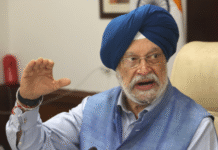New Delhi– Cutting across party lines, states across the country have expressed willingness to join hands with the central government in rolling out the Goods and Services Tax (GST) regime — but with riders to protect their interests.
The GST bill, which was long stuck in the Rajya Sabha where the Narendra Modi government did not possess a majority, was finally passed by parliament’s upper house on Wednesday. The Lok Sabha had passed it last year.
West Bengal Chief Minister Mamata Banerjee sought that as states wanted to give relief to micro and small businesses, they must remain under the control of the states.

Endorsing Banerjee’s views, West Bengal Finance Minister Amit Mitra said the GST’s primary focus was to benefit micro, small and medium enterprises (MSMEs).
“In the single-tax regime, MSMEs must be benefitted. Bigger industries can manage a multiple-tax regime but smaller players are fed up with multiple taxes,” said Mitra, who is also Chairman of the Empowered Committee of State Finance Ministers on the GST regime, in Kolkata.
“Dual control will be allowed for entities with annual turnover of more than Rs 1.5 crore, while small players, with less than Rs 1.5 crore annual turnover, will be in the state’s control,” he said.
Terming the passage of the GST Bill unanimously a historic moment, Karnataka Chief Minister Siddaramaiah said as the GST was the brainchild of the earlier UPA government, the NDA regime had to amend the Bill to meet the demands of the Congress in order to safeguard the interests of the people and the states.
“The GST Bill was originally drafted by the UPA government to usher in the concept of aone nation, one tax. As the NDA government’s Bill had some lacunae, our party suggested certain amendments, which were conceded for its smooth passage in a bipartisan spirit,” he told reporters in Bengaluru.
Siddaramaiah, who also holds the finance portfolio, said Karnataka was ready to implement the GST regime from April 1, 2017.
Himachal Pradesh Chief Minister Virbhadra Singh also said it was the previous Congress-led UPA government that conceived the GST Bill, while rincipal Secretary Finance Shrikant Baldi said the state would definitely be benefitted with the GST.
Bharatiya Janata Party MP Anurag Thakur, who is from Himachal, said the GST would have a positive impact on the Indian economy.
Haryana Finance Minister Capt Abhimanyu announced that the state was prepared to implement the GST regime.
“The state excise and taxation department was preparing a roadmap to implement the GST regime. The concerned officials have been imparted training on how to implement it effectively,” he told reporters in Chandigarh.
Political parties and their leaders in Odisha expressed hope that the GST Bill would bring tax reforms in the country.
“The GST Bill will bring uniform tax rate throughout the country and help in seamless movement of goods and services across the states,” Odisha Finance Minister Pradeep Amat said in Bhubaneshwar, adding that the GST regime would provide more relief to the economy, industry, trade and agriculture.
“The state will also be empowered to tax on services,” Amat asserted.
In Kerala, Jose Sebastian of the Gulati Institute of Finance and Taxation said the e-commerce segment would come under the tax net in the GST regime.
“Being a consumer state, Kerala will get Rs 4,000 crore every year once GST is in place. When GST become a reality, tax revenue which has been going to states from where the goods were purchased, will come to our state,” Sebsatian told IANS in Thiruvananthapuram.
CII’s Kerala State Council chairman Harikrishanan Nair said traders would benefit from GST on account of zero rate tax on exports.
In Maharashtra, Gera Developments Managing Director and CREDAI Vice President Rohit Gera said the GST, should take care of home buyers by ensuring it does not increase the cost by raising the tax incidence on them.
SBI Chairperson Arundhati Bhattacharya said in Mumbai that GST would result in efficiencies by enabling seamless movement of goods and integration of markets across the country.
“The structural transformation of GST in the long term will be enormous and our bank is fully geared to meet the implementation challenges and the necessary IT support will be in place in due time,” she added. (IANS)







